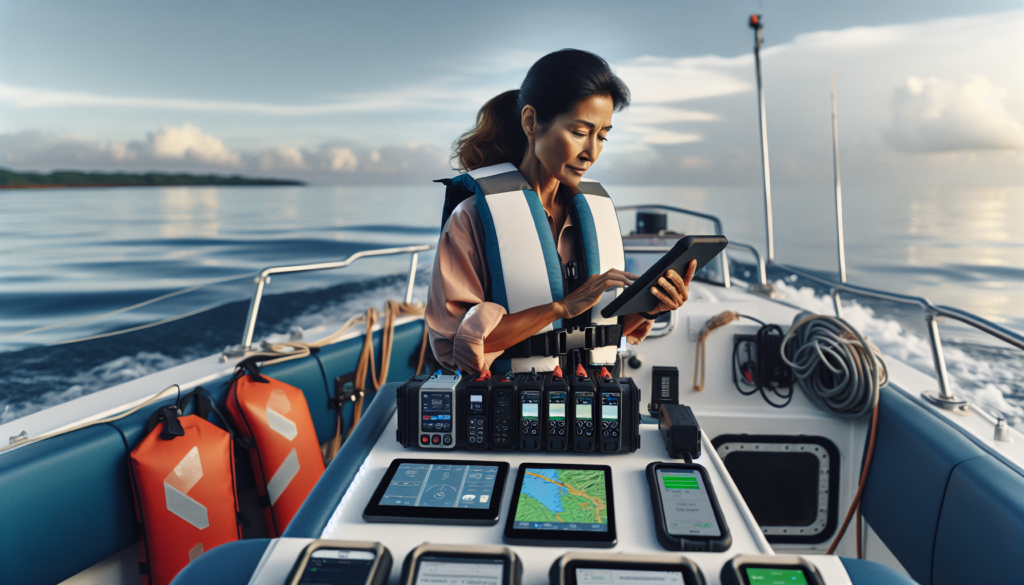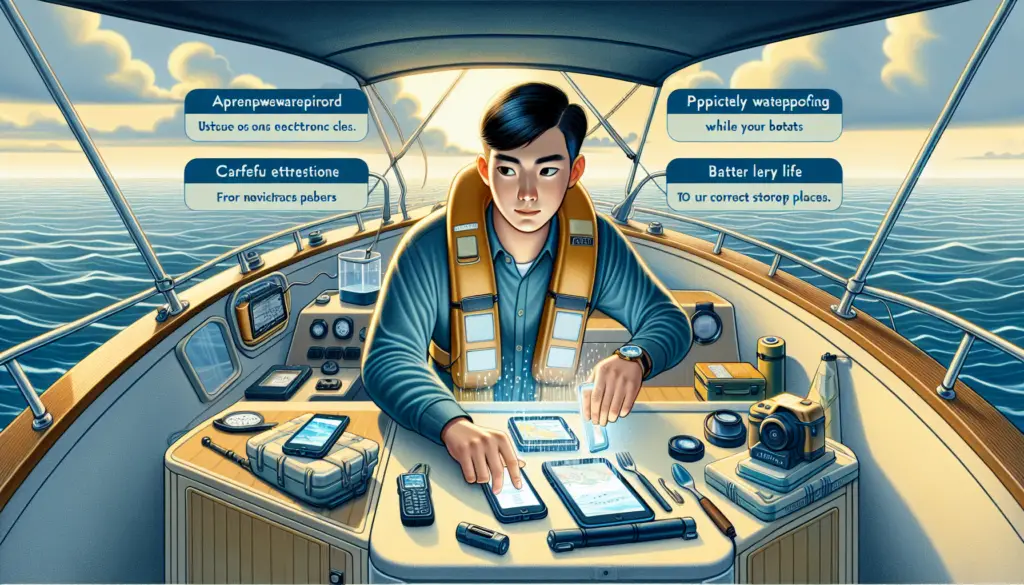Imagine yourself aboard a sleek yacht, a gentle breeze ruffling your hair as the sun glistens off azure waters. What if we said this blissful scene could be enhanced? That’s right! “Boating Safety Tips For Electronic Devices Use” is designed to help you optimize your experience on the water. It’s not just about safe boating; it’s about smart boating — using technology to heighten your maritime adventures while prioritizing your safety. This article is your guide to confidently navigate the high seas with the best use of electronic devices. A unique blend of safety and technology, mixed with the thrill of boating — the perfect cocktail for passionate mariners and tech-savvy sailors alike!

The Importance of Electronic Devices in Boating
The remarkable era of technological advancement has bestowed upon us numerous boating aids that have significantly revolutionized maritime navigation. These electronic devices have made the perilous waterways more manageable, making our journey more fun and less hazardous.
Significance of GPS Navigation
GPS Navigation serves as the metaphorical compass in modern maritime navigation, helping you steer your course through the vast expense of the ocean. This system operates by deciphering satellite signals to pinpoint your location accurately, hence allowing you to map out a precise routeway. It is an indispensable tool that ensures a safe journey in the waters, especially in complicated water terrain and unfavorable weather conditions.
Understanding The Roles of Sonar Systems
Sonar systems or depth finders are another essential electronic device used in vessels. They emit sound waves into the water and interpret the echoes to provide details about the bottom infrastructure, as well as the existence of underwater schools of fish or other obstacles. This system can be a lifesaver in unfamiliar or shifty waterways, enabling you to avoid hazardous objects beneath the surface.
Use of Communication Systems
Communication systems in boats, namely marine radios, serve as the primary means of communication at sea. They facilitate instant communication with other vessels, marinas, or emergency services. This could be particularly useful in emergency situations, where quick communication can mean the difference between timely rescue and dire consequences.
Understanding Waterproof and Water-resistant Devices
To decide on the essential electronics for your boat, one must understand the concepts of water resistance and waterproofing. This knowledge is vital given the watery environment in which these items will operate.
Difference between Waterproof and Water-resistant
Water-resistant devices can withstand light water exposure, such as drizzle or accidental splashes. However, they may not effectively function if submerged under water or exposed to heavy rainfall. On the other hand, waterproof electronic devices are designed to resist continuous contact with water. They can survive immersion, making them ideal for the aquatic environment of boating.
Why Choose Waterproof Electronics Over Water-resistant
While both types offer certain levels of protection, waterproof electronics are typically more suited for boating activities. Their capability to withstand submersion makes them more dependable. Additionally, with the unpredictable nature of marine environments, it is safer to opt for equipment that ensures maximum protection against water damage.
How to Check if Your Device is Waterproof
There are various ways to verify your device’s waterproof capabilities. Look for the International Protection Rating (IP rating) on your device. This system classifies the degrees of protection provided against intrusions like water damage. For instance, a rating of IPX7 or higher indicates that your device should be water-resistant or waterproof.
Proper Care and Maintenance of Electronic Devices on Boats
Like any other equipment, the durability of your electronic devices depends much on their maintenance. Proper care is crucial to ensure their optimized longevity and continued performance.
Cleaning Electronics After Use
After each boating trip, it’s important to clean your electronics with a soft, damp cloth. Avoid using harsh cleaning chemicals, as they could damage the screen or casing. While cleaning, inspect for signs of wear and tear or other potential issues.
Handling of Devices During Boat Movement
While underway, it’s crucial to secure your electronics to prevent them from bouncing around, which could lead to damage. Use mounts, brackets, or straps to hold them steady. Also, make sure to cover your electronics when they’re not in use to protect them from various elements.
Proper Storage Techniques
When your electronics are not in use, especially over extended periods, they should be stored in a cool, dry place. Extreme temperatures and moisture can deteriorate your devices over time, thus taking a toll on their performance.

Responsible Use of Electronic Devices on Boats
Electronic devices are certainly beneficial, but they should not entirely replace fundamental navigation and communication skills. Responsible use is key to a safe and enjoyable boating experience.
Avoid Over-dependence on Electronics
While the comfort that technology provides can be appealing, it is important to avoid over-reliance on your gadgets. Batteries may drain, systems may fail, so it’s crucial to learn traditional navigation and communication techniques. Be an alert and prepared boater, able to respond effectively even when your technology fails.
Balancing Use of Devices and Awareness of Surroundings
Moreover, one should strike a balance between electronic navigation and surrounding awareness. Keep an eye on the water, as relying solely on electronic maps may not alert you to every possible hazard, especially those that move or change with the water, e.g., other boats, floating debris, and maritime creatures.
Regulations Regarding the Use of Electronics at Sea
Certain regulations govern the use of electronics at sea. Familiarize yourself with these rules to avoid any non-compliance issues. Always remember, responsible boating includes adhering to the laws regarding sea voyage.
Appropriate Use of GPS Navigation Systems
Enhancing your navigation skills involve proper understanding and application of your GPS Navigation Systems. This can significantly streamline your journey and ensure more safety.
Programming Destination and Route
Before setting off, you should program your desired destination and route into your GPS. This process involves inputting waypoints and checkpoints. Strive to familiarize yourself with this process, so you are not learning as you go, which may be a little difficult.
Monitoring Progress
As you navigate, frequently check your GPS to monitor your progress. Ensure that you are following the planned route and make necessary adjustments if you deviate.
Understanding GPS Limitations
Although a GPS is a terrific navigation tool, it’s essential to comprehend its limitations. For one, it requires a clear line of sight to satellites to function correctly. Moreover, the accuracy of your GPS can waver due to factors like atmospheric conditions, signal multipath, or satellite positioning.
Safe Use of Radios and Communication Devices
Radios and other communication devices are an integral part of your electronic gear. They provide an invaluable lifeline between your vessel and the rest of the world.
Understanding VHF Marine Radio Functions
VHF (Very High Frequency) radios are a boater’s primary means of communication. Understand the basic operations of the device, such as how to switch between channels, how to transmit, and how to tune in for weather alerts. Knowing how to operate your VHF radio can make journeys a lot safer.
Emergency Calls and Distress Signals
Knowledge of how to make emergency calls and distress signals via your marine radio is a must. In a situation where you are in trouble at sea, you need to alert fellow mariners or emergency authorities promptly. The universal distress signal is the call, “Mayday.”
Proper Communication Etiquettes on Marine Radio
There are certain standard etiquettes to follow while communicating on marine radio. Use clear and concise language, be professional, and respect the privacy of others by not interrupting transmissions unnecessarily.
Power Management on Boats
Power management is a vital aspect of boating, as the proper functioning of your electronic devices largely depends on it. Strive to understand and manage your boat’s power needs effectively.
Understanding Your Boat’s Power Needs
Know your boat’s power needs – how much each of your electronic devices consumes. This will help you strike a balance between power availability and device usage. It will also allow you to better manage your batteries, ensuring they don’t deplete prematurely.
Prioritizing Use of Electronics
Learn to prioritize the use of your devices based on necessity and power usage. Remember, not all electronics need to be running all the time. Setting such priorities can aid in efficient power utilization.
Emergency Backup Power Solutions
In addition to your boat’s primary power source, you should always have an emergency back-up. This could be a portable generator or additional batteries. They will come in handy if your primary power source fails or runs out.
The Role of Battery in Electronic Devices
No electronic device can operate without a good source of power. Thus, batteries play a significant role in the smooth operation of your boat’s electronics.
Battery Maintenance
Just like your other boating equipment, batteries require regular maintenance to remain effective. Regular cleaning, timely charging, and checks for any corrosion or irregularities will ensure longer battery life.
Signs of a Failing Battery
Stay vigilant for signs of a battery that’s losing its capacity. Dimmed lights, low device performance, or difficulty starting your engine can all point to a failing battery. It is smart to replace it before it stops working completely.
Choice of Batteries
Choosing the right kind of battery can drastically affect the performance of your electronics. Look for batteries that match your equipment’s power requirements and those with longer life spans. Consider options like deep-cycle batteries for devices that consume more power.
Evaluating the Condition of Electronic Devices Before Every Trip
A pre-trip check of your electronic devices can save you from unforeseen troubles during your voyage. An evaluation is necessary both before and during your journey.
Pre-Departure Electronics Check
Before departure, you should turn on all your electronics and check their functionalities. Ensure your GPS marks your correct location, your radio transmits and receives, and all other gear operates as expected.
Mid-Trip Check
Regular inspections during your trip can help you identify and address minor issues before they turn into significant problems.
Addressing Technical Issues
If you notice any irregularity or malfunction, do not procrastinate its resolution. Some minor adjustments might do the trick, but if a problem persists, it is better to refer to the device’s manual for troubleshooting or consult a professional immediately.
Tips for Using Electronic Fishing Systems
Using devices like fish finders can ease your fishing expedition immensely. These electronic systems reveal the presence of fish in the vicinity, enhancing your fishing success rate.
Using Fish Finders Effectively
A fish finder operates by bouncing sonar waves off the underwater objects and interpreting the readings to display the information graphically. To use it effectively, you must understand the feedback on the screen and correlate that with the real conditions under the water.
Interpreting Fish Finder Readings
Interpreting a fish-finder involves understanding different colors and shapes and what they signify. Changes in color typically display the intensity of the returned sonar waves. The different shapes and symbols represent fish, vegetation, and bottom structure. Essentially, proficiency in this interpretation helps in more accurate and effective fishing.
Maintenance of Fish Finder Systems
Lastly, maintaining your fish-finder systems involves protecting it from harsh weather and water. Clean after every use and store in a safe, dry place. Manual checks and occasional professional servicing can greatly enhance the gadget’s lifespan.
In conclusion, as an avid boater or fisherman, understanding, selecting, maintaining, and using electronic devices effectively can significantly enhance your marine experiences. Rejoice in the sea’s boundless pleasures and stay safe, aided by your efficient and reliable electronic companions.

